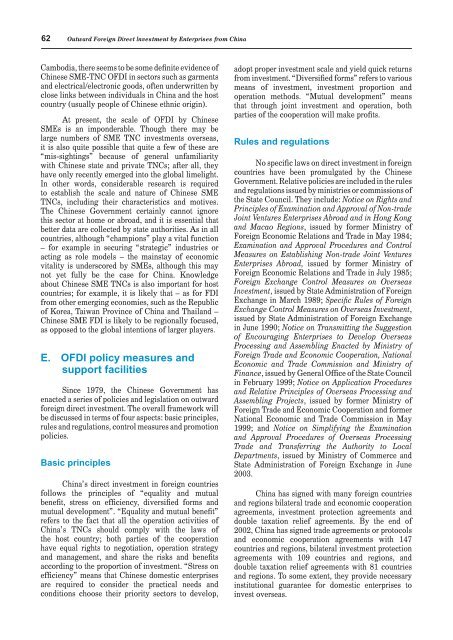Global Players from Emerging Markets: Strengthening ... - Unctad
Global Players from Emerging Markets: Strengthening ... - Unctad
Global Players from Emerging Markets: Strengthening ... - Unctad
Create successful ePaper yourself
Turn your PDF publications into a flip-book with our unique Google optimized e-Paper software.
62 Outward Foreign Direct Investment by Enterprises <strong>from</strong> China<br />
Cambodia, there seems to be some definite evidence of<br />
Chinese SME-TNC OFDI in sectors such as garments<br />
and electrical/electronic goods, often underwritten by<br />
close links between individuals in China and the host<br />
country (usually people of Chinese ethnic origin).<br />
At present, the scale of OFDI by Chinese<br />
SMEs is an imponderable. Though there may be<br />
large numbers of SME TNC investments overseas,<br />
it is also quite possible that quite a few of these are<br />
“mis-sightings” because of general unfamiliarity<br />
with Chinese state and private TNCs; after all, they<br />
have only recently emerged into the global limelight.<br />
In other words, considerable research is required<br />
to establish the scale and nature of Chinese SME<br />
TNCs, including their characteristics and motives.<br />
The Chinese Government certainly cannot ignore<br />
this sector at home or abroad, and it is essential that<br />
better data are collected by state authorities. As in all<br />
countries, although “champions” play a vital function<br />
– for example in securing “strategic” industries or<br />
acting as role models – the mainstay of economic<br />
vitality is underscored by SMEs, although this may<br />
not yet fully be the case for China. Knowledge<br />
about Chinese SME TNCs is also important for host<br />
countries; for example, it is likely that – as for FDI<br />
<strong>from</strong> other emerging economies, such as the Republic<br />
of Korea, Taiwan Province of China and Thailand –<br />
Chinese SME FDI is likely to be regionally focused,<br />
as opposed to the global intentions of larger players.<br />
E. OFDI policy measures and<br />
support facilities<br />
Since 1979, the Chinese Government has<br />
enacted a series of policies and legislation on outward<br />
foreign direct investment. The overall framework will<br />
be discussed in terms of four aspects: basic principles,<br />
rules and regulations, control measures and promotion<br />
policies.<br />
Basic principles<br />
China’s direct investment in foreign countries<br />
follows the principles of “equality and mutual<br />
benefit, stress on efficiency, diversified forms and<br />
mutual development”. “Equality and mutual benefit”<br />
refers to the fact that all the operation activities of<br />
China’s TNCs should comply with the laws of<br />
the host country; both parties of the cooperation<br />
have equal rights to negotiation, operation strategy<br />
and management, and share the risks and benefits<br />
according to the proportion of investment. “Stress on<br />
efficiency” means that Chinese domestic enterprises<br />
are required to consider the practical needs and<br />
conditions choose their priority sectors to develop,<br />
adopt proper investment scale and yield quick returns<br />
<strong>from</strong> investment. “Diversified forms” refers to various<br />
means of investment, investment proportion and<br />
operation methods. “Mutual development” means<br />
that through joint investment and operation, both<br />
parties of the cooperation will make profits.<br />
Rules and regulations<br />
No specific laws on direct investment in foreign<br />
countries have been promulgated by the Chinese<br />
Government. Relative policies are included in the rules<br />
and regulations issued by ministries or commissions of<br />
the State Council. They include: Notice on Rights and<br />
Principles of Examination and Approval of Non-trade<br />
Joint Ventures Enterprises Abroad and in Hong Kong<br />
and Macao Regions, issued by former Ministry of<br />
Foreign Economic Relations and Trade in May 1984;<br />
Examination and Approval Procedures and Control<br />
Measures on Establishing Non-trade Joint Ventures<br />
Enterprises Abroad, issued by former Ministry of<br />
Foreign Economic Relations and Trade in July 1985;<br />
Foreign Exchange Control Measures on Overseas<br />
Investment, issued by State Administration of Foreign<br />
Exchange in March 1989; Specific Rules of Foreign<br />
Exchange Control Measures on Overseas Investment,<br />
issued by State Administration of Foreign Exchange<br />
in June 1990; Notice on Transmitting the Suggestion<br />
of Encouraging Enterprises to Develop Overseas<br />
Processing and Assembling Enacted by Ministry of<br />
Foreign Trade and Economic Cooperation, National<br />
Economic and Trade Commission and Ministry of<br />
Finance, issued by General Office of the State Council<br />
in February 1999; Notice on Application Procedures<br />
and Relative Principles of Overseas Processing and<br />
Assembling Projects, issued by former Ministry of<br />
Foreign Trade and Economic Cooperation and former<br />
National Economic and Trade Commission in May<br />
1999; and Notice on Simplifying the Examination<br />
and Approval Procedures of Overseas Processing<br />
Trade and Transferring the Authority to Local<br />
Departments, issued by Ministry of Commerce and<br />
State Administration of Foreign Exchange in June<br />
2003.<br />
China has signed with many foreign countries<br />
and regions bilateral trade and economic cooperation<br />
agreements, investment protection agreements and<br />
double taxation relief agreements. By the end of<br />
2002, China has signed trade agreements or protocols<br />
and economic cooperation agreements with 147<br />
countries and regions, bilateral investment protection<br />
agreements with 109 countries and regions, and<br />
double taxation relief agreements with 81 countries<br />
and regions. To some extent, they provide necessary<br />
institutional guarantee for domestic enterprises to<br />
invest overseas.

















